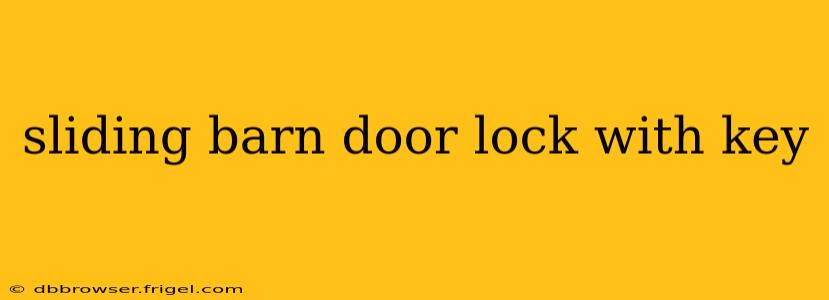Sliding barn doors add a touch of rustic charm and space-saving functionality to any home. But with their unique design, securing them properly is crucial. This guide explores sliding barn door locks with keys, providing a comprehensive overview of options, features, and considerations to help you choose the best lock for your needs.
What are the different types of sliding barn door locks with keys?
Several types of keyed locks offer security for sliding barn doors. These include:
-
Surface Bolt Locks: These are the most common type, attaching to the door and frame. They typically feature a keyed cylinder and a bolt that extends to secure the door. Installation is usually straightforward, even for DIY enthusiasts.
-
Mortise Locks: Requiring more advanced installation skills, mortise locks are set into the door itself. They offer a more integrated and aesthetically pleasing look, but installation may necessitate professional help. These offer superior security compared to surface bolts.
-
Floor-Mounted Locks: These locks are installed on the floor and engage with a mechanism on the bottom of the door. They are less common for interior barn doors but offer robust security, especially in high-traffic areas or for heavier doors.
How do I install a sliding barn door lock with a key?
Installation varies depending on the type of lock you choose. Surface bolt locks generally involve drilling pilot holes and securing the lock with screws. Mortise locks require more precision and expertise, often involving chiseling out a recess in the door. Floor-mounted locks require precise placement and secure fixing to the floor. Always consult the manufacturer's instructions for your specific lock model. If you lack confidence in DIY installation, it's best to hire a qualified professional to ensure correct fitting and optimal security.
What are the benefits of using a keyed sliding barn door lock?
The primary benefit is enhanced security. A keyed lock provides an extra layer of protection compared to unkeyed latches or simple slide bolts, especially in areas where privacy or security is paramount. Keyed locks are particularly beneficial for:
- Bedrooms: Providing extra privacy and security for occupants.
- Bathrooms: Ensuring personal privacy.
- Home Offices: Protecting sensitive documents and equipment.
Beyond security, keyed locks offer peace of mind and contribute to a feeling of safety within the home.
What features should I look for in a keyed sliding barn door lock?
Consider these features when selecting a keyed sliding barn door lock:
- Material: Look for durable materials like solid brass or steel for longevity and resistance to tampering.
- Finish: Choose a finish that complements your door and interior design. Options include brushed nickel, oil-rubbed bronze, and polished chrome.
- Keyway: Consider the type of keyway and its security level. Higher-security keyways offer greater resistance to picking.
- Ease of Installation: Choose a lock with straightforward installation instructions and readily available hardware.
Are keyed sliding barn door locks difficult to install?
The difficulty of installation depends largely on the type of lock and your DIY experience. Surface bolt locks are generally considered easy to install, while mortise locks require more skill and precision. If you're unsure, consulting a professional installer is always a good option. The complexity also depends on the type of sliding barn door hardware you have installed. It's crucial to accurately measure and assess before beginning installation to avoid potential complications.
Can I use a regular door lock on a sliding barn door?
No, standard door locks are not designed for the sliding mechanism of barn doors. They may not function correctly and could damage the door or track system. Always use a lock specifically designed for sliding barn doors. Trying to adapt a regular door lock will likely compromise both security and the smooth operation of the door.
How much do keyed sliding barn door locks cost?
Prices vary depending on the lock type, materials, and brand. Surface bolt locks are typically more affordable than mortise locks or floor-mounted options. Expect to pay anywhere from a few tens of dollars to well over one hundred dollars, depending on the features and quality of the lock. It's crucial to balance cost with the level of security required for your specific needs.
